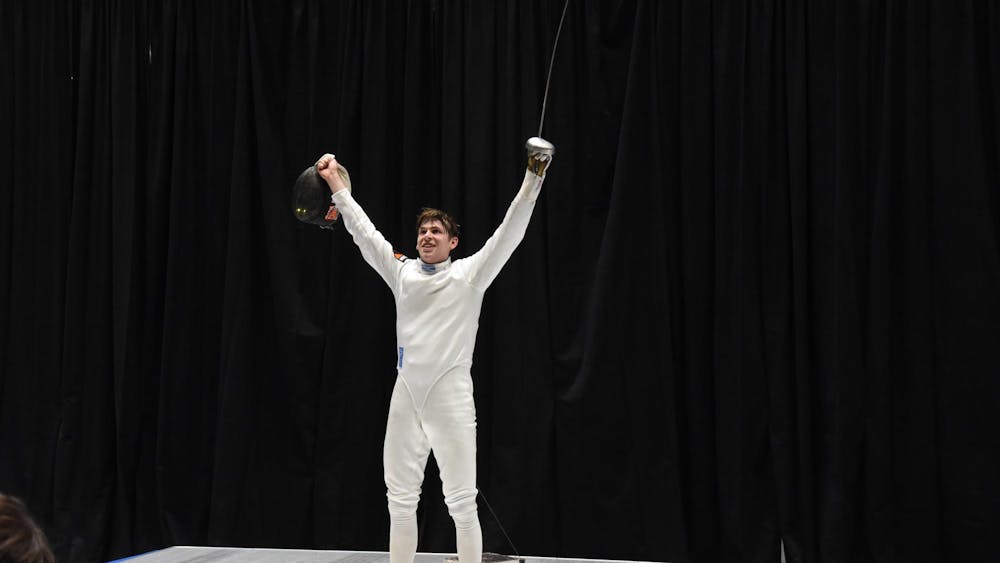With an NCAA Champion, an NCAA Semifinalist, six All-Americans, and two Olympic qualifiers, Princeton fencing has proven why it is a top-ten fencing program in the country this year.
With the conclusion of their collegiate season at the NCAA Championships in Columbus, Ohio, at the end of March, the Princeton men’s and women’s fencing programs closed the books on one of their best performances in recent history.
NCAA Regional Dominance
Success for the Tigers built throughout the season, beginning with a commanding performance at NCAA regionals earlier in the year.
Collegiate fencing is distinct in that the athletes — who are split by weapons (épée, foil, saber) and gender — compete individually as well as towards overall team performance scores. Each ‘bout’ fenced accrues points that contribute to that individual fencer’s percentage victory, which is also pooled towards the combined team standings.
Princeton took home three of the six possible NCAA Mid-Atlantic/South Regional titles, with Junior épée Jessica Lin and Senior saber Ryan Jenkins topping the podium along with Senior épée Tristan Szapary.
“We had a pretty strong performance as a team [at regionals] heading into NCAAs, so it was a huge boost for our confidence as a whole knowing we were feeling ready to go and put up a fight,” Jenkins noted to the ‘Prince.’
Beyond team confidence, regionals are a key factor in NCAA Championship qualifications, as regional scores count for 60 percent of a fencer’s resume with the selection committee, with their regular season performance accounts for the other 40 percent.

NCAA Championship Triumphs
With the weight of their regional success, Princeton Fencing had 11 of 12 maximum possible fencers selected for bids by the NCAA Men’s and Women’s Fencing Committee for Championship competition. This means the Tigers had a large cheering force on the strip and 11 fencers contributing towards the team’s overall points.
“The support is huge... in the finals each team has all of their qualifiers supporting and you can hear them on the strip, Szapary remarked.
Szapary said that strong support from the Tiger sideline translated to results, running the table to win Princeton’s only NCAA individual championship of the season.

Last year, in his first Championship appearance, Szapary finished in 10th place at the tournament. Now, he closes out his Tiger career as only the ninth Princeton men’s fencer to win an NCAA individual championship. Szapary is the first to achieve this feat since Jonathan Yergler ‘13 in 2012.
The winning run began in the round-robin portion of the competition, where each qualifier fences short 5-touch bouts against 23 competitors hoping to clinch a spot in the final four, fencing off in longer 15-touch bouts for the title.
“This is my second NCAAs, the first one was last year and that’s what I learned that it's a mental battle since it’s so different from other competitions,” Szapary told the ‘Prince.’
After narrowly securing his spot in the top four, Szapary went on to defeat top-seeded Henry Lawson of Harvard 15–9 in the semifinal, who had won 17 of 23 bouts prior to the weekend’s contests.
“I was actually down after the first period by 3 touches,” Szapary noted. “But I wasn’t thinking about it, I was just focused on the fencing so I was able to come back and beat him pretty handedly” he continued.
In the finals, Szapary secured his title in a close 15–14 bout victory over Notre Dame’s Jonathan Hamilton-Meikle.
Szapary trailed only at the very start of the championship bout. After that, he built up his lead throughout the match, eventually reaching a 7–0 margin. Following a double touch at 14–13, Szapary secured his 15 points — and with it, the national championship berth.
TRISTAN SZAPARY IS THE 2024 #NCAAFENCING ÉPÉE CHAMPION! pic.twitter.com/3c9jn4dKWR
— Princeton Fencing (@TigerFencing) March 24, 2024
“This was the best way to go as a senior,” Szapary remarked. “It reflected three plus years of hard work and trying to build a team culture that could win.”
Ryan Jenkins, Szapary’s fellow regional champ, also had the best run of her Tiger career at the NCAA championships making it into the semifinals.
Heading into the final four competition against St. John's Julia Cieslar, Jenkins had won 18 of her 23 pool bouts. Unfortunately, Cieslar advanced to the finals over Jenkins 15–9, but this still marked the best finish of her three NCAA Championship appearances.
“I could not have imagined a better outcome,” Jenkins expressed. “I was hoping for a top four finish, but didn’t know if it was in the cards because everyone there is so strong.”
Ryan Jenkins finishes her Tiger career as a three-time All-American, making the NCAA saber semifinals!
— Princeton Fencing (@TigerFencing) March 22, 2024
St. John’s’ Julia Cieslar moves on to the final, 15-9. pic.twitter.com/cFdGO490nN
The performances of Szapary and Jenkins, along with the nine other Tiger qualifiers, culminated in Princeton’s fourth-place team finish with 131 total wins. Despite being one spot off the trophy stage, the Tigers walked away from the weekend with six All-American honors and exciting momentum heading into next season.
Olympic qualifiers
Beyond NCAA dominance, first-year saber Tatiana Nazlymov and sophomore épée Hadley Husisian both have qualified for the 2024 Summer Olympics in Paris in both the individual and women’s team events, proving the squad’s weight beyond the NCAA to represent the United States on the global stage.
“They are the most hardworking people and incredible athletes, it’s so well deserved,” Jenkins remarked on Nazlymov and Husisian’s qualifications.
Following months of qualification competitions and acquiring points, both Nazlymov and Husisian managed to gain enough points to secure their places.
“We try to build a culture of excellence, a culture of almost near professionalism, and that gets validated when we have multiple of our competitors qualify for the Olympics and not just do well on the collegiate circuit,” Szapary explained.
Husisian is currently on a gap-year from Princeton, fully dedicating her time to preparing for Paris this summer.
Olympic competition is structured differently from NCAAs, where individually the first fencer to reach 15 points or have the highest number of points after three three-minute rounds wins the match. For the team section, the first team to score 45 points or lead the score when the allotted time ends wins the match.
Though success on the international stage is nothing new for Nazlymov and Husisian, the former No. 11 world junior women’s saber and No. 1 world junior women’s épée fencers respectively, their biggest challenges yet will undoubtedly come in Paris this summer.
“I think it really is a testament to not only the resiliency of the team but also the individual strengths of our team members,” Junior épée Ryan Lee said on the pair’s upcoming Olympic debuts.
“It’s great to show everyone [that] Princeton Fencing remains one of the best in the nation.”
Ava Seigel is an assistant Sports editor for the ‘Prince.’
Please direct any corrections requests to corrections[at]dailyprincetonian.com.








